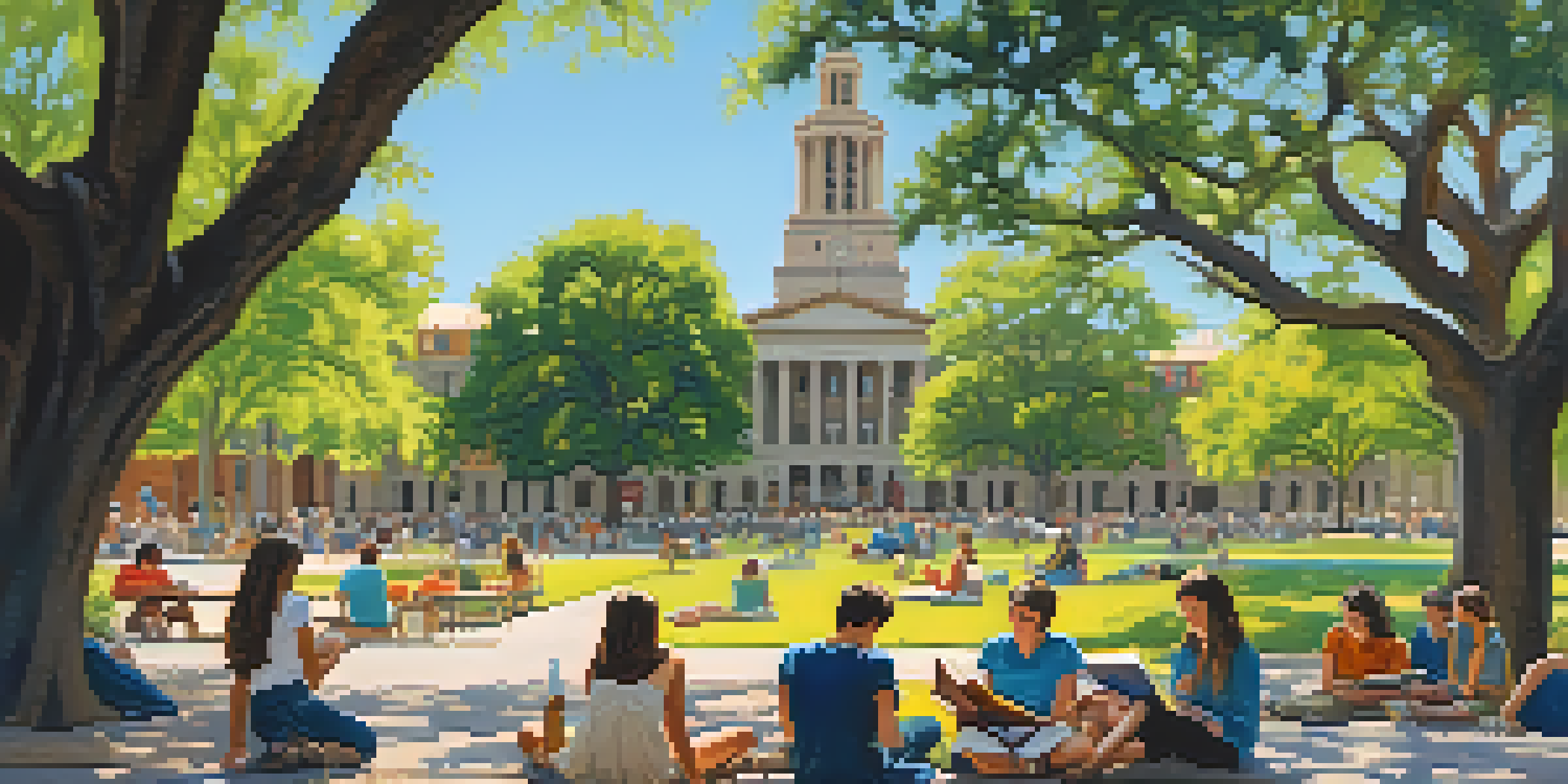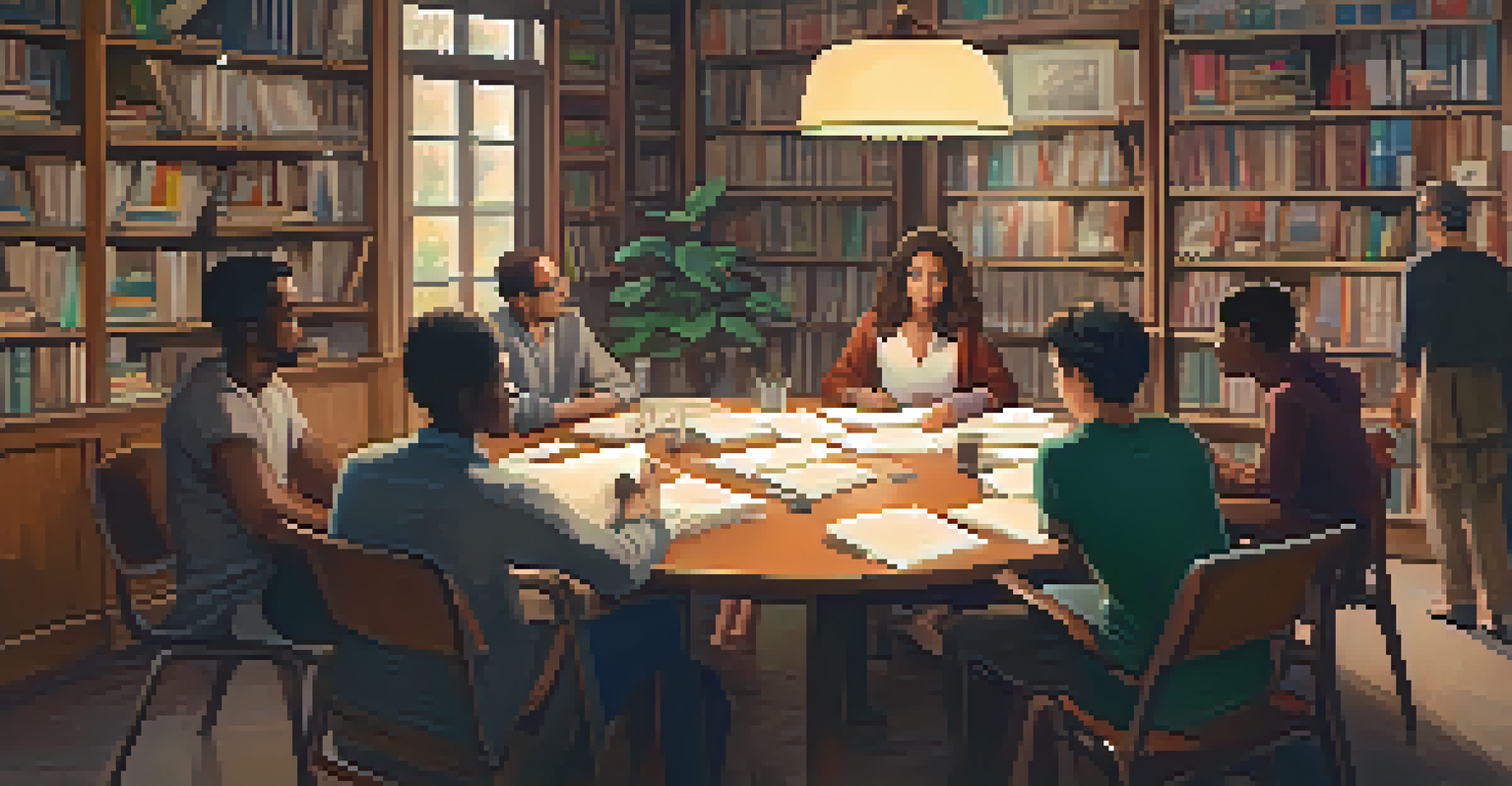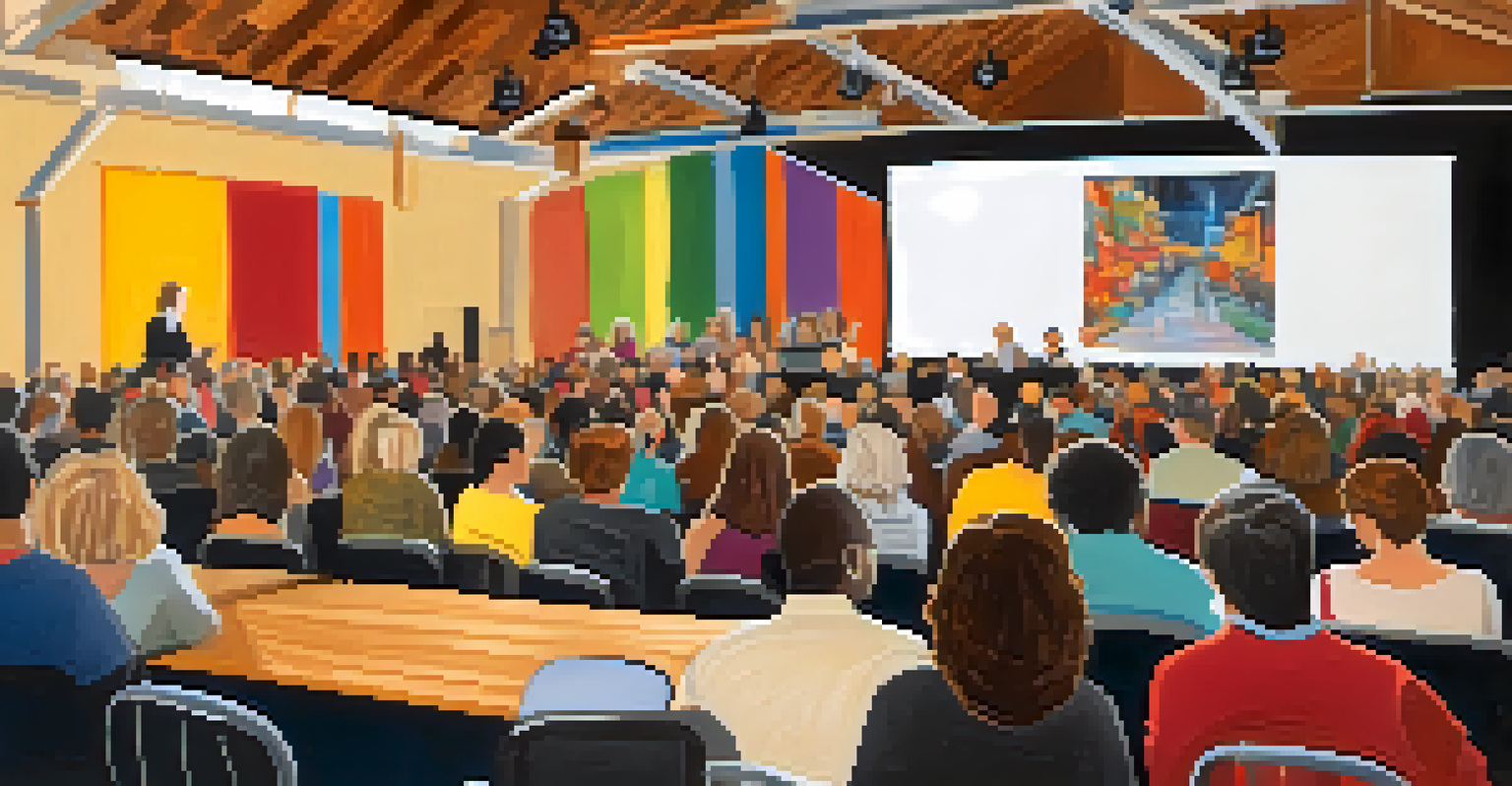The Influence of the University of Texas on Austin's Literature

A Brief History of the University of Texas
The University of Texas (UT) was founded in 1883, quickly becoming a cornerstone of higher education in Texas. Over the years, it has fostered a vibrant academic environment that attracts students and faculty from around the globe. This diverse community has played a pivotal role in shaping Austin's cultural landscape, especially in literature. As a result, the university has produced a remarkable number of influential writers and thinkers who contribute to the city’s literary identity.
Literature is a way of life; it is the life of the mind.
UT's commitment to research and creativity has established it as a hub for literary innovation. Notable programs, such as the Michener Center for Writers, have nurtured countless emerging authors, providing them with the resources and mentorship necessary to thrive. The center’s interdisciplinary approach encourages writers to explore various genres and styles, further enriching the literary fabric of Austin. Through these efforts, UT has become synonymous with literary excellence.
As Austin continues to grow, the university's legacy will undoubtedly influence the next generation of writers. The interplay between academic rigor and creative expression at UT serves as a model for aspiring authors. This unique environment not only shapes individual careers but also contributes to the overall richness of Austin's literary scene.
The Role of Literary Programs and Workshops
Literary programs at the University of Texas are vital in cultivating talent and passion for writing. Workshops provide students with hands-on experience, allowing them to refine their craft while receiving constructive feedback from peers and seasoned writers. These sessions often lead to a sense of community among participants, fostering collaboration and support that extends beyond the classroom. This nurturing environment helps to create a thriving literary culture in Austin.

In addition to workshops, the university hosts various readings, lectures, and events featuring esteemed authors and poets. These gatherings not only inspire students but also engage the broader Austin community, bridging the gap between academia and the public sphere. By inviting well-known writers to speak, UT encourages a dialogue about literature that resonates with both aspiring and established authors. This connection enriches the city's literary landscape, making it a vibrant space for expression.
UT's Role in Literary Excellence
The University of Texas fosters a vibrant literary community, nurturing talent and creativity through its diverse programs and workshops.
Furthermore, UT's literary initiatives often intersect with local organizations, creating partnerships that promote literature throughout Austin. Collaborations with local bookstores, libraries, and literary festivals amplify the impact of the university’s programs. These joint efforts help to cultivate a strong literary community, allowing writers to connect with audiences beyond the campus, ultimately enriching Austin's cultural life.
Notable Alumni and Their Contributions
The University of Texas boasts a remarkable lineup of alumni who have left an indelible mark on the literary world. Writers like Pulitzer Prize-winning author Larry McMurtry and acclaimed poet Naomi Shihab Nye have roots at UT, showcasing the university's ability to produce influential voices. Their works reflect not only personal experiences but also the broader cultural narratives of Texas and the Southwest, resonating with readers across the globe.
The power of the written word is not just in its ability to tell stories, but in its capacity to shape our understanding of the world.
These notable alumni serve as a source of inspiration for current students, demonstrating the diverse paths a literary career can take. By sharing their journeys and insights, they encourage aspiring writers to pursue their passions and explore different genres. This mentorship fosters a sense of belonging and purpose within the literary community at UT, motivating students to contribute their unique perspectives to Austin's literary scene.
Moreover, the success of UT alumni often leads to increased visibility for Austin's literary culture. As these authors gain recognition, they shine a spotlight on the city, attracting further talent and interest in its vibrant literary landscape. This cycle of inspiration and achievement continues to strengthen the connection between UT and Austin's rich literary tradition.
The Influence of Local Literary Events
Austin is known for its dynamic literary scene, with events like the Texas Book Festival and the Austin International Poetry Festival drawing crowds from all over. These gatherings provide an essential platform for writers, including many from UT, to showcase their work and connect with readers. Such interactions foster a sense of community and encourage dialogue about literature, enriching the overall experience for both writers and audiences.
Local literary events often feature discussions and panels led by UT faculty and alumni, showcasing the university’s prominent role in shaping the conversation around literature. These events encourage collaboration and exchange of ideas, allowing participants to explore new perspectives and themes. The resulting synergy between the academic and local literary communities enhances the quality and diversity of literary expression in Austin.
Impact of Local Events on Literature
Local literary events in Austin, often featuring UT alumni and faculty, create a platform for collaboration and engagement that enriches the city's literary culture.
Additionally, these events often inspire community engagement, encouraging residents to support local authors and bookstores. This support fosters a culture of reading and writing, nurturing future generations of writers. Ultimately, the influence of local literary events extends far beyond the immediate community, solidifying Austin's reputation as a literary hub.
The Impact of Diversity in Literature
Diversity is a cornerstone of both the University of Texas and the city of Austin, and this rich tapestry is reflected in the literature produced here. At UT, a diverse student body brings a wide range of perspectives and experiences, which enriches the writing process. This variety fosters an environment where authors are encouraged to explore different cultural narratives, ultimately resulting in a more inclusive literary landscape.
Furthermore, the university actively promotes diverse voices through its programs, encouraging students to delve into topics that resonate with their backgrounds. This commitment to inclusivity not only benefits the writers themselves but also broadens the horizons of readers. By showcasing a wide array of stories and experiences, UT contributes to a more comprehensive understanding of the human experience, which is vital in today’s multicultural society.
As these diverse narratives gain recognition, they help to shape Austin's identity as a city that embraces and celebrates literary expression. The influence of diverse voices in literature fosters a sense of belonging, encouraging individuals from all backgrounds to participate in the literary community. This ongoing dialogue helps to ensure that Austin remains a vibrant and inclusive literary hub.
The Evolution of Austin's Literary Identity
Austin's literary identity has evolved significantly over the years, shaped largely by the influence of the University of Texas. The university has played a crucial role in nurturing local talent, creating a generation of writers who reflect the city's unique culture and values. As these authors explore themes related to identity, community, and social justice, they contribute to a rich tapestry of literature that resonates with readers both locally and beyond.
Moreover, the university's focus on innovation and experimentation in writing has fostered a culture of creativity that is distinctively Austin. This spirit encourages writers to push boundaries and explore new genres, resulting in a diverse range of literary works. As the city embraces its identity as a cultural melting pot, the literature produced reflects the dynamic and ever-changing landscape of Austin itself.
Diversity Shapes Austin's Literature
The diverse voices at UT contribute to a more inclusive literary landscape, reflecting the multifaceted experiences and narratives of the community.
As Austin continues to grow and transform, the university's influence will remain pivotal in shaping its literary identity. The collaborative relationship between UT and the local literary community ensures that new voices will emerge, contributing to an ongoing dialogue about what it means to be an Austinite. This evolution not only enriches the literary scene but also reinforces the city’s reputation as a vibrant center for creativity.
Looking Ahead: The Future of Literature in Austin
The future of literature in Austin looks promising, thanks in large part to the ongoing influence of the University of Texas. As the university continues to attract talented writers and thinkers, it will undoubtedly produce the next generation of influential voices. These emerging authors will not only shape the literary landscape of Austin but also contribute to broader conversations about culture and identity in Texas and beyond.
In addition, the university's commitment to diversity and inclusion will play a significant role in the evolution of Austin's literary scene. By embracing a wide range of perspectives and experiences, UT will help to ensure that the literature produced in the city remains dynamic and relevant. This focus on inclusivity will encourage new authors to share their stories, enriching the literary fabric of Austin.

As Austin's literary community continues to grow, the relationship between the university and the city will remain integral to its success. With ongoing support for local events, programs, and initiatives, the University of Texas will help to cultivate a vibrant literary environment that inspires and nurtures future writers. The ongoing collaboration between UT and the local literary scene promises to keep Austin at the forefront of literary innovation and expression.